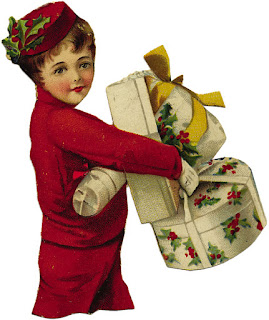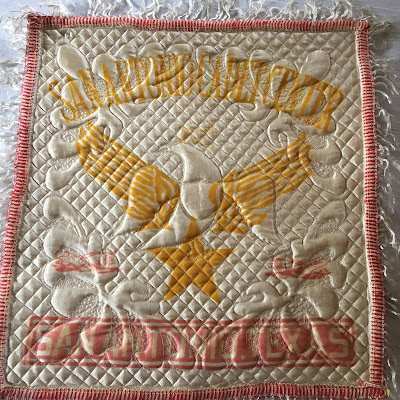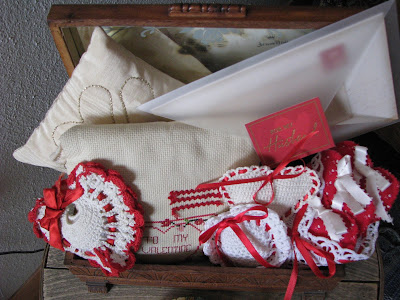A few weeks backs......while rumbling around in the store room, trying to make some progress and doing a little cleaning and sorting.....I came across this World War II pillowcase from San Antonio and knew immediately that my dad's Uncle Leonard Weaver had probably sent it or brought it home to his parents.
The vintage linen collection from both of the grandma's is vast and frankly pretty stellar for those that like that sort of thing like this writer does. I had no idea, there was such a piece and had no memory of it at all. So it was a nice surprise that day and I pretty much knew there was a project coming on for my dad on Father's Day.
Several years ago it worked out for an interview of my great-uncle Leonard while he was here visiting his Iowa family around Traer......where he grew up. I did not know him that well because they lived in California and Arizona for his adult life after the war. But I knew he was a favorite of my Grandma Mildred (his sister).....she always spoke so kindly about him. He was the youngest boy of their family. Here is the interview that I transcribed as he spoke.
I interviewed Leonard
Weaver at Iowa Star Quilts on October 12, 2004.
He was here in Iowa visiting family. He lives in California. I am writing this as was told to me and noted
when I asked specific questions. Sheri
R. Lesh
I enlisted 2/5/42. I and several others from the area went
to Des Moines to sign up. My parents did
know ahead of time that I was going to enlist.
I enlisted so I would have a little more control in what branch of
service I would be in.
My training included
a school in Tulsa, Oklahoma; Spartan School of Aeronautics. Then to Louisiana to train on maintenance for
AT-6 planes. I then went to another
training center down the coast at Victoria, Texas.
For Cadet training I was sent to San Antonio, Texas, then on
to pilot training at Sikeston, Missouri. This is called Primary training. Dad & Mom Weaver & Mildred came down
to see me there.
Then went on to Winfield, Kansas; then on to Pampa, Texas
for Basic Flight Training, I graduated from there and received my wings &
commission.
On to Ft. Worth, Texas for B-24 Flight Training.
Then to Lincoln, Nebraska and received our crew assembly
there.
Then headed to Casper, Wyoming for further training.
I left from New Jersey to take a boat across the ocean to
Liverpool. I didn’t really like being at
sea.
I don’t know how to swim and there were enemy subs out
there. We always road in convoys for
protection. You were not suppose to use
electric razors because the sonar could pick up the signal from that. I remember a guy really got in trouble for
using his razor.
From Liverpool I went to Casablanca, Africa. Then on to Bari, Italy.
My squadron finally arrived in Ceriignlo, Italy.
I flew my missions from there. The date would have been
August 1944.
My squadron was made up of 12 plane crews.
I flew 3 days and then off some days, hit and miss. But it varied, sometimes you would fly
several days in a row, before you had a day off.
I flew mostly in Austria, Southern Germany, and Northern
Italy. Our targets were marshalling
yards, factories, and fuel storage sites.
I probably killed a bunch of people when we hit those targets. (Sheri--I did ask him what his thoughts were
about that.) He answered, you were young
and you just did it because you had to.
You developed a kind of confidence in what you were doing, after going
up many times.
I was first injured December 12, 1944. The navigator took us down in over Zabreg,
Yugoslavia. We were in heavy flack. I
was hit in the knee. It felt like
someone hit my knee with a baseball bat. I had the co-pilot fly the plane back,
but I came back up in the cockpit and helped land it. The plane was not particularly damaged. The
shots had just shot through the skin of the plane and hit me.
I was injured the second time, April 25, 1945 over Linz,
Austria. There was heavy flack. The sky was black from them. We were hitting marshalling yards. I was hit in my left arm and damaged a nerve. It was a permanent injury. The plane again was OK.
When we got passes we would go to Naples or Rome.
One time when we were in Rome, the sidewalks were very wide
& we were walking side by side, one of the paratroopers came by and hit me
in the face. I had a black eye for quite
awhile. I would not fly for awhile
because of that. There was a rivalry
between the Air Force & the Paratroopers.
Another time we went to Capri I went with another squadron because
I was still healing up from my knee injury.
We didn’t enjoy it so much because it was cold while we were there. The Italians took us out on a boat trip,
fishing. They would fish with bombs, put
an explosive in a can and throw it out in the water and then the fish would
surface, belly up.
(Sheri--I asked him if he ever was scared.) My co-pilot would freeze. The radio operator would lay down on the
floor of the plane with flak suites laid under him to protect to himself. His oxygen came unhooked one time and the
co-pilot saw it and connected it back up; that saved his life. He was turning blue, so if he had not done
that, he would have died.
We used oxygen at 12,000 feet. We normally flew at 22,500 feet.
We would usually fly about 6 hour missions, approximately.
When we went to Vienna, that was hard, flack was bad there. A very heavy concentration of anti-aircraft.
I lost my next door
neighbor (tent besides mine). They had
gone to do a milk run that day. One of
the planes went in the tail of another plane and many were lost that day
including several buddies. One of the guys that survived parachuted out through
the nose wheel opening.
I had two good friends from northwest Iowa, went through
most of my training with them. Their
name was Schindler. They were brothers
and at that time, they kept them together.
They were on the same mission.
One was flying “Lead.” The other
one flying “Able.” The one brother
flying “Lead” was hit and went down.
While the other brother watched and he just went to pieces and was hit
also. (Lead, Able, Baker, etc. Leonard told me this is what they called the
planes in formation, following the alphabet.)
We always had food, although you sometimes got tired of the
rations. When fresh eggs came in they were very popular.
I always flew the same model of plane, but not always the
same plane, some were better than others.
You didn’t want to get an old plane with lots of hours.
I never encountered
fighter planes though. The Germans would pick up planes that had been shot
down, scavenge parts from all different ones and put together another one that
they would take up and be a scout.
Looking for where we were running out routes and what altitude we were
at and then radio the information down to the ground. That would give them very accurate statistics
on where to fire their anti-aircraft at us. (heavy flack.)
I met my wife Chris in Denver, Colorado, Fitzsimmons General
Hospital. I ended up there after being
in several other hospitals from the wound to my arm. They actually sent me to
the wrong hospital, amputees were sent to Colorado, but they moved me to
another area in the hospital. I retired
from service there. The war was over at this point. I met Chris on a blind date. This was in 1947.
I didn’t think about the danger much we just did it but the
artillery guys would say they didn’t want to do what we were doing. They wanted to stay on the ground. I still think it is hard to think about. It makes me emotional.
I haven’t seen the WWII memorial. Maybe I will if I have the opportunity.
My navigator is living and an attorney; Sr. Advisor to the
Attorney’s Office in New York City.
My co-pilot is in South Dakota. I still keep in touch with them.
This picture was taken when he was back here in Iowa on leave c.1943
B-24 Liberator
Now back to the pillowcase from San Antonio.....you might notice in his story, that was near the beginning of his training, so I am thinking in c.1942.
Father's Day 2018.....a gift to my dad!
This was how it ended up. My dad loved it! He never remembered seeing it either.
Of course there needed to be a label as this piece has a story to tell.
He received many awards and metals including a purple heart for his service. This article tells of his marriage to Chris and his service record from the Traer Star Clipper. A farm boy from Traer, Iowa to a WWII B-24 bomber pilot in the European theater.....pretty amazing!
Sadly he passed away on January 16, 2008 and as far as I know he never got to see the World War II Memorial in Washington DC. He did not talk about his experience in the war and when I gave my Grandma Mildred a copy of this interview, she really knew none of the information that he had told me.










































